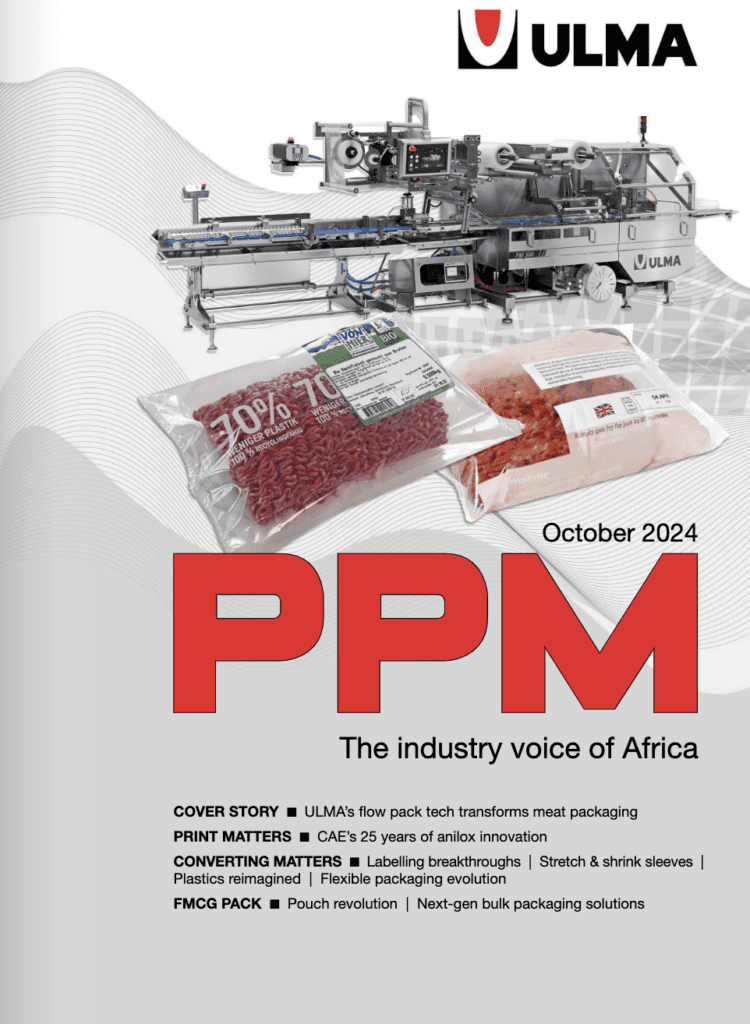
As published in Packaging & Print Media (PPM) – October 2024
At first glance, plastics may seem to conflict with the circular economy goals. The traditional ‘take, make and dispose’ model is giving way to a more restorative, regenerative approach. Despite this perception, plastics remain vital in various industries, including packaging. Carolyn Kellock, PlastiColors’ technical manager, explains: ‘Plastics are not the enemy. They are an indispensable part of modern life, and with proper recycling processes, we can significantly reduce their environmental impact.’
Polyethylene terephthalate (PET) is at the forefront of this revolution. It’s the most recycled plastic worldwide and boasts a closed-loop recycling capability that outshines other polymers. ‘No other plastic resin can make a stronger closed loop recycling claim,’ adds Carolyn. PET’s clarity, lightweight nature and durability make it a strong contender in the fight for sustainability, especially when paired with innovative masterbatches and compounds.
Mastering the art of rPET
rPET plays a critical role in reducing the environmental footprint of plastic packaging. However, it poses certain challenges because the recycling process shortens polymer chains and therefore makes processing more difficult. This is where Sukano’s masterbatches come in. ‘Thanks to the Sukano® Melt Enhancer Masterbatch, we can not only recycle PET, but also upcycle it,’ says Carolyn. ‘This technology strengthens the recycled polymer chains, restoring their melt strength and enabling high-quality packaging production.’
It’s important to note that working with melt flow enhancers is tricky and a sensitive process and can lead to machine blockages should any downtime with the polymer occur within the machine. The reactions are continuous and cannot be stopped once the product is in the machine. According to Carolyn, a safer option is to add a selected Sukano Impact Modifier masterbatch. ‘These masterbatches enable producers to include a higher dosage of rPET in the core of the end application, while maintaining (or even improving) the cost base and ilm performance.’
This masterbatch allows manufacturers to create high-performance bottles and trays from recycled materials without compromising quality or functionality. In fact, rPET enhanced by Sukano’s masterbatch offers greater mechanical performance and processing stability, opening doors for brands eager to increase their use of recycled content while maintaining product integrity, she adds.
One of the biggest obstacles to greater rPET use is declining bale quality as demand grows. Poor sorting and contamination reduce recyclers’ yields and increase the cost of producing usable rPET. Sukano’s Anti-Yellowing Masterbatch addresses these issues head-on by neutralising impurities and improving the optical clarity of the recycled plastic.
‘With Sukano’s masterbatches, we can tackle the discolouration that occurs during the recycling process,’ notes Carolyn. ‘This technology helps maintain the quality of the packaging while incorporating higher percentages of rPET, which is a win for sustainability.’
Driving innovation
Sukano’s innovations extend beyond enhancing rPET. The company has pioneered slip and anti-block masterbatches that reduce the coefficient of friction in PET films and sheets, making them easier to process and handle. This is crucial for thermoformed packaging, where parts need to demould and denest without sticking or damaging the surface.
‘By reducing friction and improving transparency, these masterbatches not only streamline production, but also improve the overall appearance and quality of the packaging,’ she explains. ‘It’s a perfect example of how smart additives can enhance performance across the board.’
‘As more companies embrace the circular economy, the demand for rPET will only increase,’ Carolyn notes. ‘Sukano’s masterbatch technologies allow us to stay ahead of the curve, ensuring that even low-quality recycled materials can be used effectively and sustainably.’
In a world where sustainability is no longer an option but a necessity, Sukano and PlastiColors are paving the way for more efficient, eco-friendly plastic packaging solutions. Their collaborative approach ensures that businesses can confidently adopt circular practices while enhancing the quality and performance of their products. As she puts it: ‘The time for change is now and we’re here to help drive that change forward.’
With masterbatch solutions that support higher rPET content, improved processing and better quality, Sukano and PlastiColors are proving that plastic can indeed be part of the solution in the circular economy.





